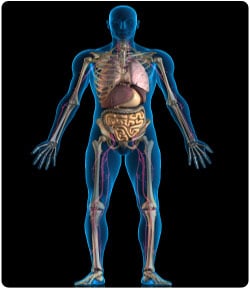A naturally occurring protein, sFRP4, could be as effective as leading cancer drug Avastin in stemming cancer, it has been found.
A naturally occurring protein, sFRP4, could be as effective as leading cancer drug Avastin in stemming cancer, it has been found.
sFRP4, the protein, is known to play an important role in promoting cell death (for example in mammary cells once the young are weaned); promoting cell proliferation; promoting cell differentiation; and, in this new discovery, blocking blood-vessel proliferation.An international team including several researchers from the University of Western Australia conducted animal trials with the protein, and the results have been published in the American Journal of Pathology.
The trials show that the protein - secreted frizzled-related protein 4 (sFRP4) - inhibits tumours to the same degree as a very successful antibody, Avastin®. Avastin® (bevacizumab) is the first U.S. Food and Drug Administration (FDA) approved therapy designed to inhibit angiogenesis, the process by which new blood vessels develop and carry vital nutrients to a tumor.
Angiogenesis, the growth of new capillary blood vessels in the body, is an important natural process in the body used for healing and reproduction. The body controls angiogenesis by producing a precise balance of growth and inhibitory factors in healthy tissues.
When this balance is disturbed, the result is either too much or too little angiogenesis. Abnormal blood vessel growth, either excessive or insufficient, is now recognized as a “common denominator” underlying many deadly and debilitating conditions, including cancer, skin diseases, age-related blindness, diabetic ulcers, cardiovascular disease, stroke, and many others. The list of diseases that have angiogenesis as an underlying mechanism grows longer every year.
Winthrop Professor Arun Dharmarajan from UWA's School of Anatomy and Human Biology said UWA and Anna University (AU), Chennai, India, hold patent applications on the use of sFRP4 as an angiogenesis inhibitor and are keen to find a commercial partner for the project.
Advertisement
Simon Handford, of UWA's Office of Industry and Innovation said: "This is still an early-stage opportunity and requires more work to validate and develop these exciting findings. Hopefully Professor Dharmarajan's publication will help bring it to the attention of biotech and pharmaceutical companies that are interested in evaluating potential cancer treatments."
Advertisement
Source-Medindia
GPL










